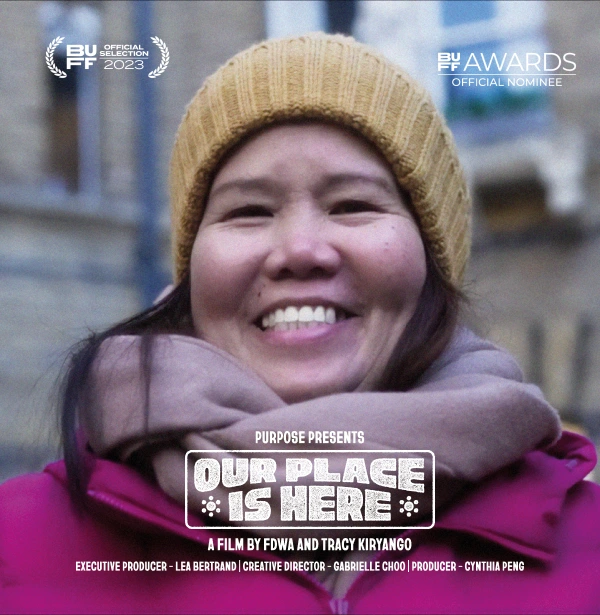Six women’s journey to a brighter future: Our Place is Here London Premiere
Six women’s journeys toward brighter futures.
Charlie Roper

According to the UK government it is estimated over 23,000 migrant domestic workers enter the UK every year. Brought over by their employers as nannies and cleaners, carers and housekeepers, they have faced decades of injustice. With their workers’ rights stripped away, they have been subjected to exploitation and abuse, inhumane hours and no minimum payment for their work. Against all odds they have carved out a community, a network that provides support, rescues survivors, and enables them to work together through training and campaigning.
On a sunny Saturday evening in East London, domestic workers, journalists, campaigners and film fans gathered at Rich Mix cinema for the London premiere screening of “Our Place is Here” as part of the British Urban Film Festival. The documentary was produced by Purpose in collaboration with migrant Domestic Workers at Filipino Domestic Workers FDWA and filmmaker Tracy Kiryango, and has gained recognition at a number of international film festivals.

The documentary Our Place Is Here, was part of the Purpose campaign of the same name, created in collaboration with director Tracy Kiryango, Purpose, Filipino Domestic Workers FDWA, Kanlungan and Kalayaan. The campaign focused on raising the voices of migrant domestic workers and building community, to raise awareness about the challenges, hostility, and abuse that many regularly face in the UK.
The facts themselves are stark and the event served as a reminder of the work still left to be done. A 2019 survey conducted by the Voice of Domestic Workers found that:
- 77% of migrant domestic workers experienced physical, verbal or sexual abuse;
- 51% reported that they were not given enough food;
- 61% were not given their own space in employers’ house
Gabrielle Choo, Global Head of Creative at Purpose served as Creative Director on the documentary and was in attendance at the screening.
“It was incredibly rewarding to work so closely with such an inspiring group of people to create this documentary. Our aim was to raise the voices of migrant Domestic Workers in the UK, and the collaborative process from conception through to post production meant that everyone involved steered their own narrative. No small feat when it comes to ethical storytelling.” Choo commented.
The evening saw a panel of key campaigners in the field of domestic workers rights gather offering perspective on how we can transform the lives of this community united in the face of such adversity.
- Phoebe Dimicali, a campaigner, housekeeper and founder of the FDWA, who has spoken at the migrants rights forum at Birkbeck University, and featured on the “City of Women London” for her lasting impact on the city
- Christanghelo Godino Barde, campaigns and advocacy manager at Kanlungan Filipino Consortium.
- Florence, founding member of FDWA and now part of it’s executive committee.
Journalist Suyin Haynes, whose work focuses on identity and underrepresented communities chaired the panel, and enabled an impassioned discussion on the struggles and triumphs of Filipino domestic migrant workers, drawing attention to their resilience in the face of exploitation and adversity.

Filmed across London and Manila, the documentary focuses on family and community, and explores the lack of workers’ rights for domestic workers as told through personal stories of six women. Although many of the stories told are harrowing, director Kiryango was keen that the film reflects the strength and empowerment that these six women are now experiencing after finding a supportive network in the UK.
“Domestic workers don’t receive the praise and adoration that they should. It’s horrifying to think that the same women these employers entrust their children and elderly family members with are the same people they so openly mistreat and disregard. This film is a reminder that these women are mothers, daughters, siblings, and friends of people who love them, and are doing their best to provide them with the bright future that they deserve.” Kiryango stated.
The result is a beautiful story of resilience and solidarity, told in their own words, reflecting the strength and empowerment of six women through their journey to a brighter life.
Dimicali noted “As much as the documentary is retelling and sharing some upsetting experiences, the film also throws light on the strong and supportive community that has developed across London thanks to the great work of charities and organizations who have become almost a second family for many of the domestic workers. The film goes beyond the dark and shows there is hope and unity amongst domestic migrant workers.”
As Florence from the FDWA shared “Domestic work is work. Why can they not be protected by the law as workers in the UK?” So how can we take direct action to affect real change in the rights for migrant domestic workers?
Kanlungan Filipino Consortium are asking for citizens of the UK to lobby their MPs by sending and sharing this letter.
Not sure who your MP is? Find out here. Together we can make a real lasting change.